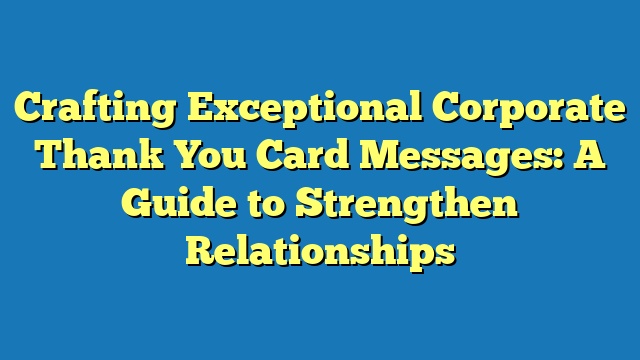A corporate thank you card message is a brief note of appreciation from a business or organization to an individual or group. For instance, a company may send a thank you card to a customer for making a purchase or using its service.
Corporate thank you card messages are important because they help build relationships and show appreciation. They can also be used to promote goodwill and strengthen brand loyalty. Historically, thank you cards have been used for centuries to express gratitude and maintain social connections.
This article will explore the key elements of a corporate thank you card message, including its tone, content, and design. We will also discuss the benefits of sending corporate thank you cards and provide tips for writing effective messages.
Corporate Thank You Card Message
Corporate thank you card messages are crucial for building relationships, showing appreciation, and promoting goodwill. Key aspects to consider when crafting an effective message include:
- Tone
- Content
- Design
- Personalization
- Timeliness
- Sincerity
- Call to action
- Measurement
The tone of the message should be professional and appreciative, while the content should be specific and relevant to the recipient. The design should be visually appealing and consistent with the company’s brand. Personalization is key to making the message more meaningful, while timeliness ensures that the recipient feels valued. Sincerity is essential for building genuine connections, and a call to action can encourage the recipient to take a desired action. Finally, measuring the effectiveness of thank you card messages helps businesses improve their communication strategies.
Tone
Tone is a crucial aspect of corporate thank you card messages, as it sets the overall mood and impression of the communication. A well-crafted tone can enhance the message’s effectiveness, while an inappropriate tone can diminish its impact.
-
Professionalism
Corporate thank you card messages should maintain a professional tone, avoiding slang, colloquialisms, or overly casual language. This conveys respect for the recipient and aligns with the formal nature of the communication.
-
Appreciation
The tone should clearly express appreciation and gratitude to the recipient. This can be achieved through the use of specific and heartfelt language that conveys the sender’s sincere thanks.
-
Sincerity
The tone should come across as genuine and heartfelt, rather than forced or perfunctory. This requires the sender to carefully consider their words and ensure that they reflect their true feelings of gratitude.
-
Consistency
The tone of the thank you card message should be consistent with the company’s overall brand voice. This helps maintain a cohesive and recognizable brand identity.
By carefully considering the tone of corporate thank you card messages, businesses can create effective communications that build relationships, show appreciation, and leave a lasting positive impression on recipients.
Content
Content is a crucial aspect of corporate thank you card messages, as it conveys the specific message of appreciation and gratitude. Effective content should be clear, concise, and tailored to the recipient.
-
Expression of Gratitude
The thank you card message should clearly and directly express gratitude to the recipient. This can be done through the use of specific and heartfelt language that conveys the sender’s sincere appreciation.
-
Specific Details
The message should include specific details about the reason for expressing gratitude. This could include referencing a particular action, event, or accomplishment of the recipient.
-
Personalization
Personalizing the thank you card message makes it more meaningful and impactful. This can be done by including the recipient’s name, referring to a shared experience, or using specific examples of their contributions.
-
Call to Action
In some cases, it may be appropriate to include a call to action in the thank you card message. This could be an invitation to connect further, provide feedback, or take a specific action.
By carefully considering the content of corporate thank you card messages, businesses can create effective communications that build relationships, show appreciation, and leave a lasting positive impression on recipients.
Design
Design plays a critical role in corporate thank you card messages, as it conveys the overall visual impression and professionalism of the communication. A well-designed thank you card can enhance the message’s impact and leave a lasting positive impression on the recipient.
One of the key aspects of design in corporate thank you card messages is visual appeal. The card should be visually appealing and consistent with the company’s brand identity. This includes using high-quality images, fonts, and colors that are appropriate for the occasion and the recipient.
Another important aspect of design is layout. The thank you card should be well-organized and easy to read. The message should be concise and clear, and the layout should allow the recipient to easily find the most important information.
By carefully considering the design of corporate thank you card messages, businesses can create effective communications that build relationships, show appreciation, and leave a lasting positive impression on recipients.
Personalization
In the context of corporate thank you card messages, personalization is crucial for creating meaningful and impactful communications that build relationships and show genuine appreciation. By tailoring the message to the specific recipient, organizations can make them feel valued and appreciated.
-
Recipient’s Name
Addressing the recipient by their name is a simple but effective way to personalize the thank you card message. It shows that the sender has taken the time to acknowledge the recipient’s individuality and makes the message feel more personal.
-
Specific Accomplishments
Referencing specific accomplishments or contributions of the recipient in the thank you card message adds a touch of thoughtfulness and sincerity. It demonstrates that the sender has paid attention to the recipient’s work or actions and appreciates their efforts.
-
Shared Experiences
If the sender and recipient have shared a particular experience or project, mentioning it in the thank you card message can make it more meaningful and personal. This shows that the sender values the relationship and the time they have spent together.
-
Customized Design
Using customized design elements, such as a personalized logo or image, can add a personal touch to the thank you card message. This shows that the sender has put extra effort into creating a unique and memorable message.
By incorporating these elements of personalization into corporate thank you card messages, organizations can create effective communications that build relationships, show appreciation, and leave a lasting positive impression on recipients.
Timeliness
In the context of corporate thank you card messages, timeliness plays a crucial role in conveying appreciation and building strong relationships. Sending a thank you card promptly demonstrates that the sender values the recipient’s time and effort and wants to express gratitude while the occasion is still fresh in their minds.
A timely thank you card message can have a significant impact on the recipient. It shows that the sender has taken the time to acknowledge the recipient’s contribution or gesture, and that their efforts have been noticed and appreciated. This can lead to increased employee morale, stronger customer loyalty, and improved business relationships.
Real-life examples of timeliness in corporate thank you card messages include sending a thank you note to a customer within 24 hours of making a purchase, expressing gratitude to an employee within a week of completing a project, or acknowledging a partner’s contribution to a successful event promptly.
Understanding the importance of timeliness in corporate thank you card messages allows businesses to develop effective communication strategies that build relationships, enhance brand reputation, and drive positive outcomes.
Sincerity
In the realm of corporate thank you card messages, sincerity is not merely a desirable quality but an essential component that elevates the gesture from a perfunctory acknowledgment to a genuine expression of gratitude. A sincere thank you card message conveys heartfelt appreciation, fostering stronger relationships and building lasting connections.
The absence of sincerity can diminish the impact of a thank you card message, rendering it shallow and impersonal. Conversely, a sincere message communicates that the sender has taken the time to thoughtfully express their appreciation, recognizing the recipient’s contribution or gesture. This genuine expression of gratitude has a profound effect on the recipient, creating a sense of value and appreciation.
Real-life examples of sincerity in corporate thank you card messages abound. A heartfelt thank you note to a customer for their continued patronage, acknowledging their loyalty and expressing gratitude for their business, demonstrates sincerity. Similarly, expressing sincere appreciation to an employee for their dedication and hard work, recognizing their specific contributions and impact on the team’s success, showcases genuine gratitude.
Understanding the power of sincerity in corporate thank you card messages enables businesses to craft effective communication strategies that build strong relationships, enhance brand reputation, and drive positive outcomes. By incorporating sincerity into their thank you card messages, organizations can create meaningful connections with customers, employees, and partners, fostering a culture of appreciation and mutual respect.
Call to action
In the context of corporate thank you card messages, a call to action serves as a subtle yet effective way to encourage the recipient to take a desired action. By incorporating a call to action, organizations can extend the impact of their thank you messages and drive specific outcomes.
-
Request for Feedback
A thank you card message can include a request for feedback, inviting the recipient to share their thoughts or experiences. This can be valuable for businesses seeking to improve their products or services.
-
Invitation to Connect
The thank you card message may extend an invitation to connect on social media, join a loyalty program, or visit the company’s website. This helps build relationships and foster ongoing engagement.
-
Promotion of Future Events
If the company has upcoming events or promotions, the thank you card message can include a brief mention and encourage the recipient to participate.
-
Encouragement for Repeat Business
For thank you card messages sent to customers, a call to action could encourage repeat business by offering a discount or loyalty points for future purchases.
By incorporating a call to action into corporate thank you card messages, organizations can maximize the impact of their gratitude, drive specific outcomes, and build stronger relationships with their stakeholders.
Measurement
Measurement plays a critical role in evaluating the effectiveness of corporate thank you card messages. By tracking key metrics, organizations can gain valuable insights into the impact of their gratitude campaigns and make data-driven decisions to improve future efforts.
One important metric to measure is the response rate. This indicates the percentage of recipients who take a desired action, such as providing feedback or making a repeat purchase. A high response rate suggests that the thank you card message was well-received and the desired outcome.
Another important metric is customer satisfaction. Organizations can send out surveys or use customer relationship management (CRM) tools to collect feedback from recipients of thank you card messages. This feedback can provide valuable insights into how the recipient perceived the message and whether it met their expectations.
By measuring the effectiveness of corporate thank you card messages, organizations can identify areas for improvement and tailor their campaigns to maximize impact. This data-driven approach ensures that gratitude is expressed in a meaningful and measurable way, ultimately strengthening relationships with stakeholders.
FAQs on Corporate Thank You Card Messages
This FAQ section provides answers to common questions and clarifies key aspects of corporate thank you card messages.
Question 1: What are the key elements of an effective corporate thank you card message?
Answer: Effective corporate thank you card messages should be professional, appreciative, sincere, specific, and timely.
Question 2: Why is it important to personalize corporate thank you card messages?
Answer: Personalization makes thank you card messages more meaningful and impactful, showing the recipient that their contributions are valued.
Question 3: What are some appropriate calls to action to include in corporate thank you card messages?
Answer: Appropriate calls to action include requests for feedback, invitations to connect on social media, and promotions for future events or purchases.
Question 4: How can organizations measure the effectiveness of their corporate thank you card messages?
Answer: Organizations can measure the effectiveness of thank you card messages by tracking response rates and customer satisfaction through surveys or CRM tools.
Question 5: What are the benefits of sending corporate thank you card messages?
Answer: Corporate thank you card messages build relationships, show appreciation, enhance brand reputation, and drive positive outcomes.
Question 6: How often should organizations send corporate thank you card messages?
Answer: The frequency of sending thank you card messages depends on the specific context, but it is generally recommended to send them promptly after a significant interaction or contribution.
These FAQs provide a comprehensive overview of corporate thank you card messages. By understanding the key elements, benefits, and best practices, organizations can craft effective thank you messages that strengthen relationships, show appreciation, and drive positive outcomes.
In the next section, we will delve deeper into the topic of corporate thank you card messages and provide additional insights and guidance.
Tips for Crafting Effective Corporate Thank You Card Messages
This section provides practical tips to help organizations create impactful corporate thank you card messages that strengthen relationships, show appreciation, and drive positive outcomes.
Tip 1: Express Sincere Gratitude
Use heartfelt language to convey genuine appreciation for the recipient’s contributions or actions.
Tip 2: Personalize the Message
Include specific details, such as the recipient’s name or accomplishments, to make the message more meaningful.
Tip 3: Keep it Concise and Clear
Craft a concise message that is easy to read and understand, avoiding jargon or technical terms.
Tip 4: Use Professional Language
Maintain a professional tone throughout the message, using appropriate grammar and avoiding slang.
Tip 5: Send the Message Promptly
Express gratitude while the occasion is still fresh in the recipient’s mind to demonstrate timeliness and appreciation.
Tip 6: Include a Call to Action
Consider adding a subtle call to action, such as requesting feedback or inviting the recipient to connect on social media.
Tip 7: Measure the Effectiveness
Track key metrics, such as response rates and customer satisfaction, to evaluate the impact of thank you card messages.
Tip 8: Be Consistent with Brand Identity
Ensure that the thank you card message aligns with the company’s overall brand voice and visual identity.
By following these tips, organizations can create effective corporate thank you card messages that build strong relationships, show genuine appreciation, and drive positive outcomes.
In the next section, we will discuss the benefits of sending corporate thank you card messages and provide additional insights into their strategic value.
Conclusion
Corporate thank you card messages play a vital role in building relationships, showing appreciation, and driving positive outcomes. By understanding the key elements, benefits, and best practices outlined in this article, organizations can craft effective thank you messages that resonate with recipients and achieve their desired impact.
Key points to remember include the importance of expressing sincere gratitude, personalizing the message, and ensuring timeliness. Additionally, incorporating a call to action and measuring the effectiveness of thank you card messages can enhance their strategic value. By embracing these principles, organizations can harness the power of gratitude to strengthen relationships, foster loyalty, and drive business success.









Tips for Using "Template by Kevin Crafts" Comments for Meaningful Online Discussions